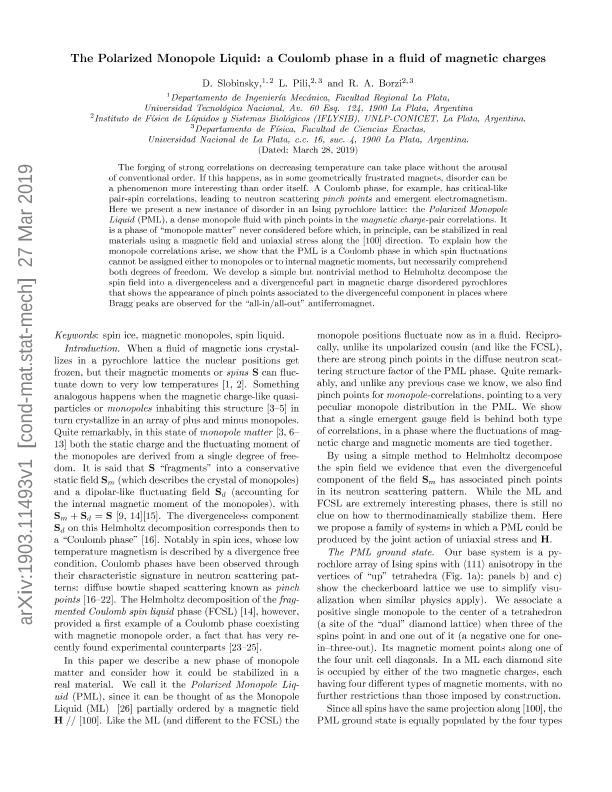Artículo
Polarized monopole liquid: A Coulomb phase in a fluid of magnetic charges
Fecha de publicación:
07/2019
Editorial:
American Physical Society
Revista:
Physical Review B
ISSN:
2469-9969
e-ISSN:
2469-9950
Idioma:
Inglés
Tipo de recurso:
Artículo publicado
Clasificación temática:
Resumen
The forging of strong correlations on decreasing temperature can take place without the arousal of conventional order. If this happens, as in some geometrically frustrated magnets, disorder can be a phenomenon more interesting than order itself. A Coulomb phase, for example, has critical-like pair-spin correlations, leading to neutron scattering pinch points and emergent electromagnetism. Here we present a peculiar instance of disorder in an Ising pyrochlore lattice: the polarized monopole liquid (PML), a dense monopole fluid with pinch points in the magnetic charge-pair correlations. It is a phase of “monopole matter” which, in principle, can be stabilized in real materials using a magnetic field and uniaxial stress along the [100] direction. To explain how the monopole correlations arise, we show that the PML is a Coulomb phase in which spin fluctuations cannot be assigned either to monopoles or to internal magnetic moments, but necessarily comprehend both degrees of freedom. We develop a simple but nontrivial method to Helmholtz decompose the spin field into a divergenceless and a divergenceful part in magnetic charge disordered pyrochlores that shows the appearance of pinch points associated with the divergenceful component in places where Bragg peaks are observed for the “all-in/all-out” antiferromagnet.
Palabras clave:
MONOPOLE LIQUID
,
FRUSTRATED MAGNETISM
,
FRAGMENTATION
,
COULOMB PHASE
Archivos asociados
Licencia
Identificadores
Colecciones
Articulos(IFLYSIB)
Articulos de INST.FISICA DE LIQUIDOS Y SIST.BIOLOGICOS (I)
Articulos de INST.FISICA DE LIQUIDOS Y SIST.BIOLOGICOS (I)
Citación
Slobinsky, Demian Gustavo; Pili, Lucas; Borzi, Rodolfo Alberto; Polarized monopole liquid: A Coulomb phase in a fluid of magnetic charges; American Physical Society; Physical Review B; 100; 020405; 7-2019; 1-5
Compartir
Altmétricas




